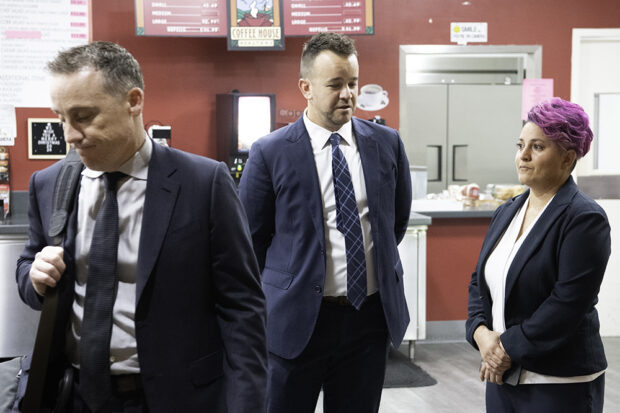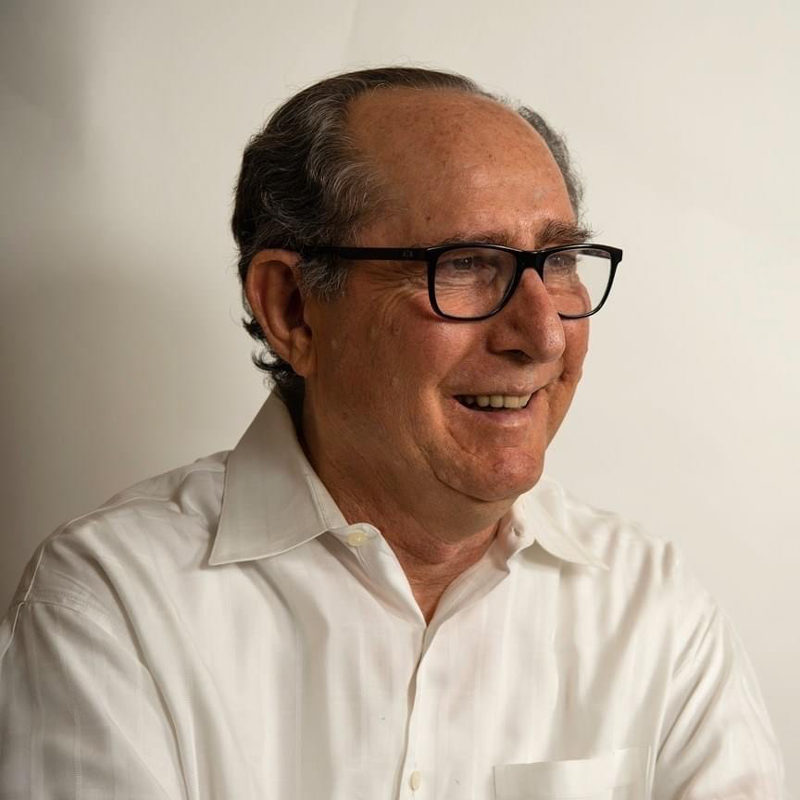
Courtroom 5 in Fresno’s Robert E. Coyle Federal Courthouse was standing room only on Dec. 17 when former Bitwise CEOs Jake Soberal and Irma Olguin Jr. were sentenced for wire fraud and conspiracy to commit wire fraud. They pleaded guilty in July.
Bitwise Industries was a tech corporation based in Fresno that provided training in coding to underrepresented groups and tech solutions for small businesses. As part of its business model, it also made space available in newly renovated workspaces in older buildings.
Bitwise grew rapidly and eventually expanded to nine other cities at the height of its apparent success. Then in a spectacular implosion on Memorial Day 2023, it suddenly collapsed and closed up shop—to the shock of its employees and the local community.
It turns out the CEOs had been defrauding lenders and investors in a bid to keep the business afloat. The FBI found that they stole $115 million.
Soberal and Olguin said all the wrongdoing was theirs.
According to sentencing guidelines, the minimum sentence the court could have imposed for each of them was five years. The maximum was 20 years. Judge John C. Coughenour sentenced Soberal to 11 years and Olguin to nine years in federal prison.
The judge said he was influenced by the sentencing of Elizabeth Holmes, former CEO of Theranos, who defrauded investors and was charged with wire fraud, in the amount of $140 million. She was sentenced to 11 years.
The judge said that he sentenced Soberal to two years more than Olguin because Soberal was a member of the bar and, as an attorney, he should have known better.
John Brown, an investigator in Los Angeles who specializes in sentencing reports, said, “It’s a lot of time, but they will be able to qualify for some programs, such as alcohol education, that will slash a considerable piece off the actual time that they serve.”
Usually, Brown said, when there is a male and a female convicted of a charge, “the male gets a little more time than the female. It’s just part of the tradition.”
Soberal told the court he had turned to drinking under the stress he was experiencing after Bitwise collapsed and as he faced charges. He asked to be incarcerated at the federal facility at Lompoc, where alcohol education is offered.
After their time in prison is served, the pair will be subjected to three years of supervised release. In addition, after a settlement with the Securities and Exchange Commission, Soberal is banned for life from leading a company that issues securities.
Soberal’s attorney, Eric MacMichael, asked the judge for the minimum sentence of five years. He argued that “the defendants did not steal out of greed.” According to MacMichael, the CEOs only committed their crimes in order to make payroll in a period of rapid expansion.
MacMichael requested the judge to consider that for Soberal, who has three young children, a sentence of five years would be “an eternity.”
Soberal confessed to the court: “I have learned that in high stakes situations I am a liar.” In therapy and through his practice of Christianity, he said he has found that “lying and cheating are not okay no matter what you are trying to accomplish.”
Several victims of Soberal and Olguin’s crimes testified about their devastating financial losses and sense of betrayal. A father and son, Jim and Bryan Maxwell, both spoke.
Soberal showed the two men falsified paperwork he said was from J.P. Morgan that showed $65 million in assets when in fact Bitwise really had around only $3,000 in its account.
The younger Maxwell, Bryan, said he had regular meetings with Soberal, but looking back, noted that “they were no more real than my niece’s make-believe tea parties.”
He lost $1,650,000—his life savings. These were not “accidental frauds,” Bryan said, but the work of “seasoned criminals.”
The older Maxwell, Jim, said Bitwise didn’t run out of money—they “ran out of people from whom to steal.”
Going forward, Jim said, “entrepreneurs with social agendas will face closed doors.”
When Olguin addressed the court, she began to cry as she apologized to her mother, and she sniffled through the rest of her remarks. “I’m sorry I broke your hearts,” she said.
Fresno author Mark Arax observed that Olguin being a “child of farmworkers and being a rural person and a gay person gave her a certain kind of credibility” with socially conscious investors. She turned her persona into a financial asset. She gave a TED talk and was on the cover of Forbes magazine, with the publicity pulling investors into the fraud.
Now, Olguin draws a starkly dark picture. Because of her actions, she said, people in tech might mistrust women, Mexican Americans and LGBTQ+ people. “I fear I dragged them all down with me,” she told the court.
Olguin and Soberal have until March 18 to arrange their affairs, and then they will begin their sentences.

A Look Back at Bitwise
BY PETER MAIDEN
Will Dyck is a commercial real estate developer who specializes in restoring older buildings for downtown businesses. He was an identified “capitalist” at Bitwise, where he was on the board for two years. He was instrumental in the development of all four of the Fresno Bitwise buildings. Bitwise owed Dyck around $750,000 in back rent when it collapsed, money he will never recover. The interview was edited for clarity.
What was the atmosphere like for you at Bitwise?
They’re nice people but very different from myself. I’m more of a logical, linear thinker. They were very outside the box. Nothing that Bitwise ever did was confined. It was always wild and outrageous.
That was just part of their ethos, part of their branding, part of their marketing, that they were something different, something special. And they worked that to the most effect. They were definitely about as outside the box as Fresno gets…They should have gone into marketing, not technology! They would’ve done unbelievably. There’s big money in that. They could have done great.
When did you first think Bitwise wasn’t sustainable?
When I was a board member, the whole ethos of Bitwise stopped passing the sniff test. It became clear—this isn’t a business, this is an idea, and this isn’t a for-profit, this is a nonprofit. And they were very candid. In the final board meetings, they said that they were not interested in making money. They were not interested in creating a self-sustaining business. They were interested in the buzzwords—changing people’s lives and investing in communities and a whole bunch of great ideas. But those aren’t businesses.
Do you think that Soberal and Olguin’s criminality started at the outset?
No, definitely not. It was a slippery slope. The financial issues started out when I was a board member. And I think it was small, incremental little things that became medium-sized things that became bigger things.
The private loans and all these off-book deals started in 2017 or 2018. What happened at the end was nothing new except that at the start it was with tens of thousands of dollars. And then around 2019, it became hundreds of thousands of dollars. By early 2020, it was probably tens of millions of dollars. And then you get to the end, and it was hundreds of millions of dollars. And it was always robbing Peter to pay Paul.
Were you shocked by the implosion of the company?
I wasn’t surprised because I never thought Bitwise really had a long-term business model, but I thought it was going to be a slow death, a dying whimper as they burned out of cash and then were unable to sustain themselves.
I didn’t know the extent of how deep the hole had been dug. I didn’t expect that they would implode overnight with no warning. If they were a traditional business and they started failing—even let’s say they were a tech company with $35 million in revenue and a thousand employees—okay, well what’s the first thing you do? Unload some of your employees. I mean, five and a half million a month in payroll! That’s extraordinary.
That’s where all the money was going. It was to try to keep feeding all these employees. It was a catch-22. They had to have employee growth so that they could keep projecting, “Oh look! This is how fast we’re growing, and we’re in 10 different cities now.” That was all part of the marketing of this explosive growth. At Bitwise, you couldn’t start laying off employees, could you? Because then people go, “Well, how is it you are growing and getting rid of employees?” It doesn’t work.


